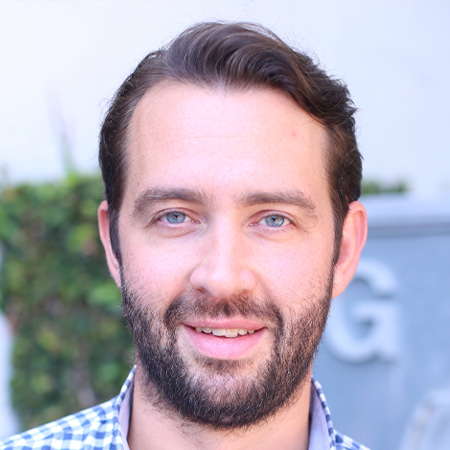
Protecting Your Personal Data
The challenges of cybersecurity have become ever more pressing, with a 20 percent increase in data breaches and twice as many victims globally in 2023, according to the Harvard Business Review. The number one method of hackers? Credential-based cyberattacks. Christian Wentz, founder and CEO of Gradient and a 2012 Hertz Fellow, is working to stop them in as permanent a way possible—by eliminating the option.
“We are all familiar with current methods to keep accounts secure: use strong and unique passwords, change them periodically, enable multi-factor authentication [MFA]. While these things offer some protection, they don’t address the core vulnerability,” Wentz said. “At least ninety-five percent of all cybersecurity attacks are credential attacks. Nothing else comes close.”
While biometric authentication such as facial recognition, voice analysis and fingerprints are an improvement, they still don’t provide a hack-proof barrier to personal data, he said. For example, so-called “deepfakes” using AI are an emerging approach that directly counters facial recognition and voice.
A major issue is that authentication methodology has remained largely unchanged since the late 1990s. For example, the lock icon that appears in your browser when you connect to a bank indicates that the connection is authenticated using Transport Layer Security, or TLS. While today you might enter a stronger password than you did 20 years ago, the end result is the same: a shared secret, known as a “session credential.” This session credential is long-lived and poorly protected. And nothing you can buy today attempts to fix this problem, Wentz said.
“If you look at the state of the internet when these protocols were invented, there were maybe tens of millions of devices. Now there are more than 10 billion devices. Operating systems have gotten at least a thousand times bigger. What this means is there are more secrets flying around networks and between pieces of software than anyone ever anticipated when they built these core protocols,” he said. “The cybersecurity industry seems to have decided that this problem is too foundational to solve. We disagree. Gradient can protect not just today’s systems but also the next wave of technology, like AI systems.”
Wentz launched Gradient to develop technology that redefines how users and devices are authenticated and how data is securely shared at internet scale. Using a system of secret keys derived from the user and their devices—keys that regularly change without ever being exposed to humans—Gradient’s technology continually verifies a user’s (or machine’s) identity, eliminating the need for passwords, multi-factor authentication and repeated logins when sessions time out.
“To use a COVID analogy, current cybersecurity technologies are like wearing masks—they’re helpful, but they don’t eliminate the virus. Our technology is the equivalent of building a vaccine that eliminates the threat by preventing the virus from binding to the cell. Instead of detecting compromises faster, we’re making compromises impossible,” Wentz said.
In a career that has straddled academia and entrepreneurship, Gradient is the third company that Wentz has launched, and the second that has leveraged connections within the Hertz Community.
He co-founded his first company, the biotech firm Cerenova, while an undergraduate at MIT. A spinout from the Massachusetts General Hospital’s neurosurgery department and Wentz’s work with neurosurgeon Emad Eskandar, the company developed novel therapeutic applications of electrical neurostimulation for recovery and improvement of learning and cognition.
“I missed my power electronics final because we were pitching [then Senator] John Kerry’s office on a line-item appropriation to fund treatment of TBI patients coming back from Iraq. We were too early with Cerenova, but I learned a ton,” he said.
During his time as an undergraduate, Wentz also conducted research in the lab of 1999 Hertz Fellow Ed Boyden, where he created wireless neural interface technology using optogenetics, a biological technique developed by Boyden to control the activity of neurons and other cells with light. This work was the basis for his second company, Kendall Research Systems, founded in 2011. The firm, led by Wentz as CEO, was the first company to commercialize wireless optogenetics instrumentation for use in the pharmaceutical industry and translational science. Later that year, Wentz was named to the inaugural Forbes 30 Under 30 in science and technology, around the same time he decided to pursue his PhD.
Wentz was awarded the Hertz Foundation Myhrvold and Havranek Family Fellowship in 2012 but, presented with yet another entrepreneurial opportunity, he deferred his PhD for a year to join the startup Misfit Wearables, where he worked on the engineering team to develop a wearable activity monitor. In 2013, he returned to MIT and to pursue his doctorate in the Media Lab’s synthetic neurobiology group, developing neural interface technologies that could be delivered to the brain through blood vessels, similar to how stents are deployed today.
In 2017 Wentz stepped away from academia again when Kendall Research Systems was acquired by another neurotech company, Kernel, and he became vice president of product. One year later he stepped down from Kernel and launched Gradient, where he realized the full impact of his Hertz Fellowship.
“It wasn’t the money, although it was helpful. It was the people,” Wentz said.
Among those is 1978 Hertz Fellow Ed Frank, who serves as Gradient’s executive chair. “I met him because I was talking to [Hertz Foundation president] Robbee Kosak about this company I was thinking of starting, and she said, oh, you should talk to Ed. And that has happened I don't know how many times.”
Wentz said he could not have been this ambitious with Gradient without the investment and influence of Honorary Hertz Fellow Harold Newman, who passed away in 2021.
“Investors typically want to see proof of value in 18 months or less, which means focusing on a single goal and building a minimum viable product. Gradient’s approach required us to rethink everything—after all, our goal is to fix the internet. We’ve built our own secure enclave processor and invented new cryptography to work at internet scale. This is a mountain of technology. We would not have been able to build that technology base without Harold’s patient capital,” he said, using the business term that describes a long-term investment without expectation of quick profit.
“We are addressing foundational problems, and it’s a rarified investor who is willing to bet on that. His confidence in our success seeded confidence that we could do this.”
Newman freely admitted that he didn’t understand the technical aspects of Wentz’s work, but he trusted Wentz’s vision and capabilities because of the credibility the Hertz Fellowship bestowed. Newman proved his depth and breadth as an investor and advisor in other ways. “It seemed like no scale of ambition fazed him,” Wentz said.
When Wentz excitedly shared the news that Gradient landed a Fortune 50 corporation—one of seven supermajor oil and gas companies—as their first customer and were discussing deployment to assets in Kazakhstan, Newman casually mentioned that he had owned an oil field there in the 1980s and offered sage advice on navigating the region’s complex geopolitics.
Wentz showed his appreciation to Newman in the best way he knew how: by funding a Hertz Fellowship in Newman’s honor in 2020. Wentz collaborated with 2003 Hertz Fellow Chris Loose, whose company also benefited from Newman’s investment, to establish the Harold Newman Innovation Fellowship, which is also supported by 1970 Hertz Fellow Lee Swanger.
Wentz views his decision to support the Hertz Foundation much the way Newman weighed the impact of the Hertz Fellowship on his investment choices.
“The Hertz Fellowship is an incredible talent selection filter,” Wentz said. “It’s like a machine that you’ve built to pick people who are going to do transformational things. And the yield is super, super high.”
Now, Wentz said, his goal is to live up to Newman’s expectations. “I remember when I told him about the oil and gas deal, he was excited for me and then said, ‘Tell me when you get another 10 million.’ It was a way of saying, ‘Good job, but it’s nowhere near enough. Keep going.’”
One of Wentz’s last conversations with Newman reflected his characteristic brassy humor. Wentz laughed in recollection. “He said, ‘By the way, you guys are part of my legacy now. So don’t screw it up.’”
